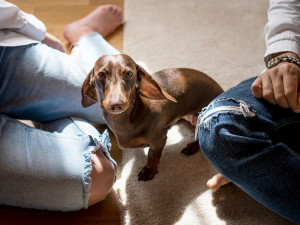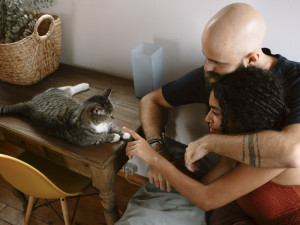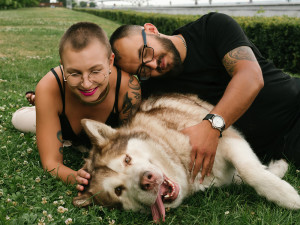Who Gets the Dog in a Break-Up?
If a ‘Great Divorce’ is coming, how should you handle custody battles and co-parenting your pet in a split?
Recently, a slightly startling phrase went viral on TikTok (what’s new?): ‘the Great Divorce’. While it may be a novel written in 1945 by CS Lewis, currently if you type those three words into your TikTok search bar, you’ll find hundreds of women discussing the coming of the Great Divorceopens in new tab – a predicted era when women will leave their husbands in droves, and many more will choose not to get married at all.
“Men are in for a rude awakening, because I think women are just done”, said one woman in a TikTok video. One woman commented, “Yes, ending my 30 year marriage because I’m done feeling disrespected and unloved.” She's not alone: “Just got divorced this month after 25 years and I feel so free!!!” said another.
Get (totally free) deals for food, treats, accessories, tech and way more pet parenting must-haves.
Clearly, something’s up. Which leads us to wonder… if the Great Divorce comes to pass, what will happen to all those shared pets? Throw a beloved pet into the mix of a messy break-up, and things get even more complicated and emotionally charged. We spoke with a family law attorney — and multiple couples who have been through the pet custody battle — to shine some light on the tricky situation.
When Claire (a pseudonym) and her ex broke up, one of the biggest points of contention was figuring out what to do with the dog they had adopted together. They tried joint-custody at first, but it was too fraught. Eventually, they decided to take the legal route, and ended up in court. As she prepared, Claire said she struggled to get a straight answer from lawyers about how to secure custody of the dog. Plus, she said, “A lot of people think it’s silly.”
After many long, expensive months of negotiation, Claire was able to legally declare sole custody of her dog. But she wasn’t alone in her confusion.
First, what does the law say?
“It’s a developing area of the law,” says Siobhan Beere, a family law attorney in New Jersey. Each state has its own laws about pet ownership, so the rules vary. Except for California, which recently passed a “pet custody law” that differentiates companion animals from other types of property, most states legally view pets as property, like a TV or a car.
Beere notes that, in New Jersey, the vast majority of divorce cases are settled out of court, and couples are encouraged to make agreements amongst themselves about what works best for them, including in terms of pet parenthood. Should your case end up in front of a judge, like Claire’s did, the first thing a judge will look for is some sort of agreement, written or otherwise, about the dog’s ownership. If no such agreement exists, it’s a good bet to bring as much documentation as possible showing that you are the dog’s primary caregiver, like adoption papers, vet bills, or doggie daycare bills.
What about joint custody?
Tim (a pseudonym) and his ex-partner, Jack (also a pseudonym) adopted their dog, Sadie (doggy pseudonym), together. When they broke up six years later, they brought in a legal mediator to help them work through some of their disputes, including the question of who would care for Sadie. They ended up settling on a joint custody agreement in which Tim and Jack would both get Sadie for two weeks at a time, and split medical expenses 50/50.
“It can be challenging to be a single dog dad,” he says, but with their set-up, both men have a built-in dog sitter whenever they need to travel. Sadie, for her part, seems happy with the arrangement. Tim and Jack both cook food for her using the same recipe, and when one of them will drop her off with the other, they’ll often leave some of their clothes so that their scent is there with her.
Still, Tim concedes that this set-up doesn’t work for everybody and that it was pretty tough, especially in the early days. Now, he and Jack are friendly, and will sometimes get dinner when they hand off Sadie to each other, but when they first started sharing dog custody, their interactions could be tense. “Rather than a breakup where your ex is completely out of the picture, we have been able to evolve to the point where we are very friendly together,” he says. “And that’s specifically thanks to Sadie.”
For those considering joint pet parenthood with an ex, Tim says the most important things are to try to take the emotion out of every discussion about the dog and to respect the love your former partner has for the dog: “What I did when we were breaking up was ask myself, How would I feel if Jack took the dog away from me? I would feel miserable, and he would feel the same way. That is the number-one piece of advice, because if you have that empathy, you can work it out.”
What’s best for the dog?
Sometimes, a dog will make the decision easy. When Emily and her ex-husband separated, they shared four dogs together. Because one of the dogs was especially bonded with her husband, and a second was especially bonded to that first dog, those two went to live with her husband, while the other two stayed with Emily. If dogs seem equally bonded with their owners, consider who has a living space best suited for a dog and who has the time and financial ability to best care for them.
Ultimately, as uncomfortable as it may be to talk about with your partner while you’re in a healthy, happy relationship that you hope will never end, the best way to avoid a messy pet-custody battle is to talk about the custody question before the potential breakup happens. “It’s a conversation that should be had before that dog is welcomed into the home,” Emily says. “Have a plan. And realize that if you don’t get the dog, there is going to be a sense of loss. But there’s always dogs out there that they can go and rescue.”










